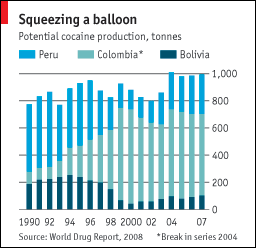Here is a list of the top ten political risks of 2009 by the Eurasia Group Risk consultancy.
The risks
1 Congress – The current financial crisis has created an unprecedented
space for government interference in economic affairs within developed states. Risk of wasteful and not useful over-regulation like Sarbanes Oxley. Sarbanes Oxley was implemented to prevent further Enrons. How useful was it for preventing or minimizing the current situation ?
2 South Asia security – The security environment in India, Pakistan, and Afghanistan will deteriorate significantly over the coming year. Afghanistan’s Taliban is mostly funded by the illegal drug’s they produce. This is discussed below in the section on Mexico.
3 Iran/Israel – 2009 is the critical year for conflict (both direct and through proxies) between Iran and Israel.
4 Russia – With oil prices well below what the Russians can afford, but Putin’s (and Medvedev’s) popularity still high, the initial moves have been to consolidate power. Yet despite no organized political opposition to speak of, we’re still starting to see social unrest. For the first time in years, there have been widespread demonstrations in Russia—in 30 cities, following the imposition of import duties on used cars
5 Iraq – The real concern at this point is the politics, not the security situation. How long the United States can maintain a commitment to significant force levels. [NOTE: The recent timetable seems sufficiently long and flexible into 2010]
6 Venezuela- Chavez plans held a referendum in the coming month to reform the Venezuelan constitution and abolish term limits (which would allow Chavez to run again for the presidency in 2012) show little likelihood of success. Then the Venezuelan president will have a real political fight on his hands.
UPDATEL Times online describes the Chevez victory to allow him to run again in 2012. H/T to reader Nova77.
7 Mexico – The Drug Cartel security situation there has worsened and is almost certain to deteriorate further over the course of 2009. Well armed and well financed narco-criminals have effectively declared war on the state of Mexico—increasingly singling out elected government officials, bureaucrats, and the armed forces and police for their attacks.
The Economist looks at the problems of the worldwide drug wara nd Mexico’s problems. Since Dec 2006, 10,000 people have died in drug-related violence in Mexico, 6,268 of them in 2008. An assessment by the United States’ Joint Forces Command, published last month, concluded that the two countries most at risk of becoming failed states were Pakistan and Mexico.
Plus low oil prices and lower oil production are hurting Mexico’s economy and finances.
The biggest worry is that some drug gangs are starting to diversify into other criminal businesses. Extortion and protection rackets are suddenly becoming common. The second growth business is kidnapping.
The Economist asks “How to stop the drug wars ?” and answers Prohibition has failed; legalisation is the least bad solution. According to the UN’s perhaps inflated estimate, the illegal drug industry is worth some $320 billion a year. The suggestion is to stop the flow of illegal money and manage the public health problem.
8 Ukraine – Ukraine’s vulnerability stems from some hard economic realities—sharply falling demand for Ukrainian exports (particularly steel); heavy private-sector borrowing in foreign currency; a big gas price dispute with Moscow; and a currency (the hryvnia) under enormous pressure.
9 Turkey – The fight pitting secularists in the judiciary, military, and industry against Islamists in government is becoming a serious obstacle to economic advancement.
10 South Africa- Jacob Zuma’s election as president is pretty much a done deal. The worry is a turn toward more influence by communists and trade unionists.

Brian Wang is a Futurist Thought Leader and a popular Science blogger with 1 million readers per month. His blog Nextbigfuture.com is ranked #1 Science News Blog. It covers many disruptive technology and trends including Space, Robotics, Artificial Intelligence, Medicine, Anti-aging Biotechnology, and Nanotechnology.
Known for identifying cutting edge technologies, he is currently a Co-Founder of a startup and fundraiser for high potential early-stage companies. He is the Head of Research for Allocations for deep technology investments and an Angel Investor at Space Angels.
A frequent speaker at corporations, he has been a TEDx speaker, a Singularity University speaker and guest at numerous interviews for radio and podcasts. He is open to public speaking and advising engagements.



